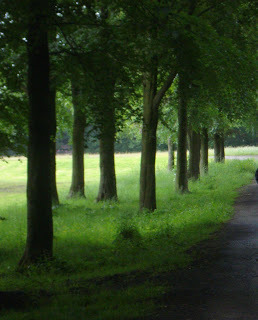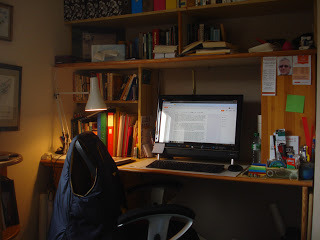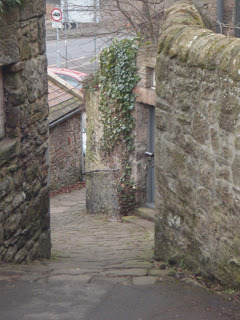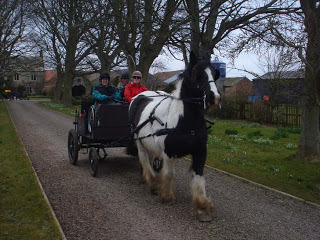Jen Black's Blog, page 97
May 6, 2013
Plots v Genre
 Sad to say, but a lot of books I read today are less than memorable. They are mostly well written but the storylines are not original. Now this isn't a criticism of the authors - at least, it is not intended as one - but more a comment on the impossibility, after four hundred odd years of printed fiction, of coming up with an original plot.
Sad to say, but a lot of books I read today are less than memorable. They are mostly well written but the storylines are not original. Now this isn't a criticism of the authors - at least, it is not intended as one - but more a comment on the impossibility, after four hundred odd years of printed fiction, of coming up with an original plot.Someone once said there are only 7 original plots in the world.
Monster: The Grendel-Beowulf type of the hero defeating the monster and that plot has been around for centuries.Then there's the rags to riches story, where the poor person makes good. Lots of books on that theme.Then there's the Quest where the hero sets out to find something he desperately wants and overcomes many difficulties but finally achieves it.The Voyage, easily confused with the Quest. This time the hero sets out in a magical land and returns wiser than when set out. Comedy - strangely, lots of romance stories fall into this categoryTragedy - best known example here is MacBeth. Re-birth - akin to tragedy but the hero realises error before it is too lateClick and see a much more detailed explanation.
At first glance it is quite hard to separate plots from genres - but here is a link to Genre.
(When did Blogger start highlighting only one letter of a link? So easy to miss.) so I shall read both and see if I can appreciate the difference.
Picture: Tim monitoring the bees among the heather...
Published on May 06, 2013 00:54
May 3, 2013
First day out and editing
 Today was the pup's first day out on a lead. It is 9.15 and already he has had two twenty-minute walks around the field. On the first he was very hesitant, tail down, bouncing around trying to see in all directions at once in case something came up and bit him. Trees were going to pounce on him, and the wind was zipping over the hill. Tim doesn't like wind, even in our garden. The second trip was much more adventurous. Tail out level, head up, going forward on the lead and already he knows where home is.
Today was the pup's first day out on a lead. It is 9.15 and already he has had two twenty-minute walks around the field. On the first he was very hesitant, tail down, bouncing around trying to see in all directions at once in case something came up and bit him. Trees were going to pounce on him, and the wind was zipping over the hill. Tim doesn't like wind, even in our garden. The second trip was much more adventurous. Tail out level, head up, going forward on the lead and already he knows where home is.I think possibly writing is much like these first trips. The first draft is always hesitant and jerky, good in parts but poorly put together. The second draft is where the jerky patches get smoothed out and the holes filled in. Then the third and fourth draft improve the basic story and the writing should become smoother and more "in voice."
I have observed that American writers (and likely their readers) prefer short, punchy sentences and fast moving stories. I think agents and publishers in this country prefer a something smoother, more literary in style - perhaps that's what they mean when they make comments like the writing is good but it didn't make my heart sing, it didn't blow me away....it could be that the story itself just isn't strong enough, too. There are so many imponderables to consider in writing. I may learn more at the Writing Conference in Newcastle tomorrow. People like Nicola Morgan will be there to tell us how it should be done! I for one will be all ears.
Published on May 03, 2013 01:52
May 1, 2013
Technology, wip and wildlife
 Technology was beating me today. I somehow lost the Chrome Home page and tried for thirty minutes to get it back - then hubby walks in, asks what the problem is. Listens, says Click on That and when I did, up jumps the original home page. Things like that make a person feel so foolish!
Technology was beating me today. I somehow lost the Chrome Home page and tried for thirty minutes to get it back - then hubby walks in, asks what the problem is. Listens, says Click on That and when I did, up jumps the original home page. Things like that make a person feel so foolish!I got some actual work on writing done yesterday, and should get more done today. I'd got myself to a tricky position and had to wait until I'd figured out how I was going to deal with it. Within a couple of days I had the problem resolved. I left Oli all tied up after his bid to free Gisla, and I mean tied up in a way that will be painful. Thorkel is a nasty piece of work, but we all knew that right from the start. This afternoon I shall release Oli from his bonds and see if his spirit has been broken. Somehow, I doubt it.
Tim the pooch is growing so fast it's almost visible. Such long legs! He seems to be teething as well, and chewing everything in sight. But on Friday his purdah days are over. By then the immunisation should have taken, and he can go out in the world. The next trick will be to get him to walk nicely on a lead. But we are adjusting to each other's routines quite well. One spin-off I hadn't expected from having Tim is that Bill and I talk to each other more than we did. Partly it comes from talking about Tim, and partly it's because we are up and about in the morning by six, usually. Today we had a lie-in; he didn't ask to go out for a pee in the middle of the night, and we all slept through till seven. Getting up so early means we have more hours in the day and includes breakfast with conversation instead of languishing in bed watching the TV news as we consume our cornflakes.
One night I went out with the pup and found a hedgehog in the garden. Tim didn't even approach it, but shied away. We've also got a baby rabbit that keeps popping through the fence from other gardens. Fortunately Tim hasn't seen it yet. It's a wild rabbit, and has no doubt been shoved out of the home warren in the nearby field to find his own territory. He seems happy enough, but one day he'll be too big to get through the fence.
Published on May 01, 2013 04:52
April 29, 2013
Cliffhangers
 Have you ever tried to explain to someone what a cliffhanger is? I suspect they became popular when Dickens, Trollope and co were writing weekly instalments and there had to be something exciting and dangerous so that people would remember and buy the newspaper or magazine the following week. Classical scholars would cite Scheherazade, who managed to save her life night after night by telling the Shah of Persia stories and always ending on a cliffhanger. Try that for a thousand and one nights and see how you fare.
Have you ever tried to explain to someone what a cliffhanger is? I suspect they became popular when Dickens, Trollope and co were writing weekly instalments and there had to be something exciting and dangerous so that people would remember and buy the newspaper or magazine the following week. Classical scholars would cite Scheherazade, who managed to save her life night after night by telling the Shah of Persia stories and always ending on a cliffhanger. Try that for a thousand and one nights and see how you fare.You could argue that cliffhangers exploit the reader. The author chooses to tie the heroine to the railway tracks and leaves her there with the distant hoot of a train in the distance, so of course the reader gets agitated. If only someone would find and free the woman then we'd all relax - and forget to buy the magazine next week. As it is we spend the entire week in a frenzy of will she die - or will she be saved?
Too many cliffhangers in one story do exploit the reader - or they annoy and irritate at the very least. But a good, gripping cliffhanger is worth it's weight in gold, and it doesn't have to be in a thriller, though the one I'm reading at the moment happens to be one of Dick Francis's classics - Come to Grief. At the end of Chapter Twelve, the hero is tied to a chair, and has watched his prosthetic arm destroyed by a one-time friend - and you just know that there is worse to come for Sid Halley.
So the essence of a good cliffhanger is the build up, I think. First of all, there has to be empathy for the victim, otherwise the reader doesn't care enough to worry. Then there must be a slow tightening of the screw, tension has to rise somehow, and then - only then, can the author bring the cliffhanger to its proper threat. And escape must seem impossible.
Published on April 29, 2013 08:45
April 26, 2013
Medieval Sickness
 I've recently bought an excellent book - The Time Traveller's Guide to Medieval England by Ian Mortimer, who also writes historical novels as James Forrester.
I've recently bought an excellent book - The Time Traveller's Guide to Medieval England by Ian Mortimer, who also writes historical novels as James Forrester.I was struck by many things as I read it, but one of them was an eye opening sequence on sickness.
The possibilities of injury were common. You could be struck by a blade, an arrow, a staff or even a cannon ball. When such injuries in themselves would not have proved fatal, the medicine of the day and lack of hygiene did the necessary.
How disease spread was quite unknown, and how the body functioned was guesswork. No one knew about circulation of the blood, so instead of feeling the pulse for signs of life, a bowl of water was placed upon the victim's chest to see if you were still breathing.
The most common cause of illness, according to the medieval mind, was divine justice. Disease was regarded as a tempering fire sent to test an individual's faith in God's mercy. Even if a cure was effected, it came courtesy of God's grace, never the skill of the doctor.
The planets and stars were thought to have an influence on health of individuals and communities and it was believed they controlled the function of organs such as the brain and liver. Medieval people had medical knowledge, but it was very different to our own, comprising as it did of astrology, herbology, religion, philosophy, a lot of hearsay and quantities of desperation.
I thoroughly recommend Dr Mortimer's book for your enjoyment. You'll learn a lot, I assure you.
http://www.amazon.co.uk/Time-Travellers-Guide-Medieval-England/dp/1845950992
Published on April 26, 2013 03:12
April 24, 2013
Looking back
 I loaded a post on Historical Fiction excerpts this morning and it made me realise how much time I've been on this writing game. I began in a very tentative way back in the seventies, when a typewriter and a bottle of sno-pak were the tools of the writers trade. Progress was slow, because I was working full-time, and leading a good social life most of the time. The pile of pages grew so very slowly!
I loaded a post on Historical Fiction excerpts this morning and it made me realise how much time I've been on this writing game. I began in a very tentative way back in the seventies, when a typewriter and a bottle of sno-pak were the tools of the writers trade. Progress was slow, because I was working full-time, and leading a good social life most of the time. The pile of pages grew so very slowly!Now, a writer's life is comparatively easy, thanks to computers. It is very easy to produce a page of immaculate typing, perfectly formatted on the page/screen, run it through the spell-and-grammar checker and be assured that it as correct as it is ever going to be. Even better, the internet makes finding facts easy if you are prepared to accept the first you find without cross-checking for accuracy.
But no matter how impressive a perfectly formatted and typed page seems, it is the content that is so vitally important. "Rubbish writing" can look equally as good as the most literary writing! Like most other skills, writing a story has to be learned skill. I doubt there's one writer in a thousand successful writers who made it with their first attempt. I know I look back on my earliest attempts and itch to get the red pen out and delete the repetitions, remove the unnecessary sentences. Maybe one day I will, if only for my own satisfaction. But looking back has made me realise how far I have come, and gives me an inkling of how far I have still to go. I suppose writing is a skill that just goes on growing until brain fade occurs.
Published on April 24, 2013 02:23
April 22, 2013
Work and where to do it
 My writing room is a little haven of sanctuary for me. Once I'm in there with the door shut, all is well with the world. It isn't luxurious. It is the smallest bedroom, and there is a single bed, and a desk-cum-bookshelf arrangement made out of an old wardrobe. The most expensive thing in it, apart from the pc, is the black swivel chair. Right now I have to share this precious space with Tim, who decided on the first day that his preferred place was at my feet, under the desk. Sometimes he lies there with his chin resting on my foot.
My writing room is a little haven of sanctuary for me. Once I'm in there with the door shut, all is well with the world. It isn't luxurious. It is the smallest bedroom, and there is a single bed, and a desk-cum-bookshelf arrangement made out of an old wardrobe. The most expensive thing in it, apart from the pc, is the black swivel chair. Right now I have to share this precious space with Tim, who decided on the first day that his preferred place was at my feet, under the desk. Sometimes he lies there with his chin resting on my foot.While I'm in here, I can be anywhere I choose. Right now I alternate between the bracing west coast of Scotland in 1045AD messing about in longships with Flane and the gang, or in Stirling in 1544 with Matho as he gears himself up to capture the queen and keep out of Lennox's way. In earlier years I spent months in Viking Dublin watching Eba run from one spot of bother to another, and breathed the fresh clear air of Victorian Northumberland two steps behind Melanie Grey as she slowly comes to believe she is falling for a smuggler. Then there was the time I wrote Shadows and re-visited the sunny delights of the Cadeau valley in France. In a way, my little room is my Tardis.
Although I've never read A Room of One's Own (actually I may have done during my university years, but cannot recall much of it beyond the general premise of a room and £500 a year) I thoroughly agree with the idea. I've tried working downstairs and it just doesn't do for me. I can't get comfortable and if I'm not comfortable, the ideas don't flow. But then, I could never start work at an untidy desk when I was "at work." Only when the desk was neat and clear could I then start on something. I have a friend who works in absolute chaos (my words, not hers) while the only thing I'm itching to do is tidy her work space! Good thing we're not all made the same way. How's your work space? Be honest!
Published on April 22, 2013 01:04
April 18, 2013
High Concept
If you are anything like me, you read the phrase High Concept and wrinkle your brow. Nicola Morgan has a talent for explaining things in terms I can understand, and I bless her time and again when she does. Here's her succinct explanation of High Concept: "Essentially, a book with an extra-strong hook. A high-concept novel is one which is easy to sell because the idea has wow factor and is easy to explain very quickly. The wow factor often comes from a sense of, “Why didn’t I think of that? That’s going to sell in shedloads. Damn it.”
High Concept often means High Stakes. The fact that you fancied a married man and bravely decided to give him up for the sake of your family is not exactly High Stakes to anyone else, though it may be to you. No one is going to die even if you do decide to kick over the traces and run off to Marrakech, though a few are going to be pretty miserable for a while. High Stakes fictionally means at least the risk death for the hero, and sometimes the end of the world. Hopefully it also means that the writing will be good.
High Concept usually means you can easily explain the premise and that it will grab attention - for example: Life of Pi by Yann Martel. The tag line that sold it was something like a boy shipwrecked on powerless boat with dying zebra, hyena and tiger called Richard Parker. For a long time I took one look at that and thought to myself What Rot. I studiously avoided reading it for almost two years, but I never forgot it. Then it became an acclaimed film, appeared on Kindle at 20p and I couldn't resist any longer. For 20p I would take a look at this strange book. Within pages, I was hooked.
Another bestseller was The Curious Incident of the Dog in the Night Time. This one I am still avoiding, and don't think I will ever read. But the tag line that sells it certainly has a stand-out quality. "An autistic savant with a fear of yellow finds a dead dog and sets out to solve the killing." Other titles might include any of the Harry Potter books, or The Hunger Games.
The trouble with agents and publishers seeking High Concept manuscripts is that, in aiming to please, there is a risk every book published will become a ride of thrilling anxiety and overdone conflict. Introspection becomes lost, and description is thrown overboard as exciting incident follows incident. Some books turn out to be quite tiring to read. There was a famous book about following clues in the Louvre that had me aching for the last chapter long before it arrived.
You can find out lots more entertaining ans useful things at Nicola's blog:
http://helpineedapublisher.blogspot.co.uk/search?q=High+concept
Published on April 18, 2013 02:37
April 15, 2013
Sorry for the delay
 DH and I were both out of action yesterday. The mystery bug finally caught up with me and gave me a miserable day. Hopefully today will be better for both of us. One good thing, if I look for positives, is that I could afford to lose a pound of two around my middle. Sitting around in a chair playing with words all day does tend to increase one's seating area.
DH and I were both out of action yesterday. The mystery bug finally caught up with me and gave me a miserable day. Hopefully today will be better for both of us. One good thing, if I look for positives, is that I could afford to lose a pound of two around my middle. Sitting around in a chair playing with words all day does tend to increase one's seating area.I've got very little writing done these last few days since Tim arrived. In another few hours he'll have been here a week. Just a week. Amazing. I've had more exercise running around the garden with him, than I've had for ages. Getting up at two or three in the morning for a trip down through the darkened house so he can go into the garden and pee hasn't been as hard as I thought it would be. Thank the Lord that Spring has brought warmer temperatures. The thought of doing 3am toilet trips in the dead of winter makes me shudder. Thankfully his bladder will soon be strong enough to make it through the night.
Tim doesn't like wind. He tends to bolt back into the house on windy days, but he follows the sun through the big windows and flops down on the carpet for a snooze. Now, once he stops using everything in sight as something to chew, we'll be making progress. The cardboard rolls from the centre of kitchen paper are so very much more chewable than the two rubber toys I've bought for him.
The pic is St Mary's Chare in Corbridge. It always gives me a feel for what medieveal streets were probably like.
Published on April 15, 2013 22:44
April 12, 2013
Lots of activity
 I am chief shit-cleaner in this house and this week has been an exceptional one. Being nervous and in strange surroundings, the pup crapped about four times a day and sometimes he didn't make it outside into the garden. Still, because he's small, the piles were tiny and anyway, you just get on with it, don't you? Small he may be, but his determination is huge, as I've found already. The second night he was not prepared to stay in his newly-purchased basket in the kitchen, not by any means. His cries, yaps and howls were probably heard right around the cul de sac! I'm ashamed to say we gave in and brought him upstairs. Peace at last. He wants to be with us, preferably both together and runs from one to the other is we do separate things in the house.
I am chief shit-cleaner in this house and this week has been an exceptional one. Being nervous and in strange surroundings, the pup crapped about four times a day and sometimes he didn't make it outside into the garden. Still, because he's small, the piles were tiny and anyway, you just get on with it, don't you? Small he may be, but his determination is huge, as I've found already. The second night he was not prepared to stay in his newly-purchased basket in the kitchen, not by any means. His cries, yaps and howls were probably heard right around the cul de sac! I'm ashamed to say we gave in and brought him upstairs. Peace at last. He wants to be with us, preferably both together and runs from one to the other is we do separate things in the house.Yesterday I went to Ogle Castle because the horses have arrived. The Magic Trust, which offers carriage driving for the disabled, runs from there. I got interested last autumn when I saw the horses pulling carriages around the Gibside estate, but they were just about to stop operations for the winter, and we were about to go off to Australia. With the coming of spring, operations are starting up again.

So yesterday I "met" the horses, Sparky and Bumper, groomed them and almost choked on the hair coming off them. They'll look much more streamlined when they've shed their winter coats. Then we were shown how to harness a horse to a carriage, and tried it ourselves - two other learner/volunteers beside myself. Complicated or what? Breastplate first, I remember that, and bridle last; but two other bits go on in between. Reins and whatever they call the "girth" that goes around his stomach and latches around his tail. It'll take me a while before I learn where all the bits go, and they have to be correctly fitted because when all is done, a wheelchair is clamped onto the bed of the carriage and the person in it drives the horse. There is an able-bodied driver beside them in case of need, and I stood on the footplate at the back to act as groom when we went out for a long walk with Sparky. Naturally I'm not in the photo, because I'm taking it as Sparky went by.
Must run, because Tim's appointment is looming! Will add pics later.
Later: Vet says Tim has a heart murmur and recommends an ultrasound scan to see what's what. H'mmmm.
Published on April 12, 2013 01:41
Jen Black's Blog
- Jen Black's profile
- 6 followers
Jen Black isn't a Goodreads Author
(yet),
but they
do have a blog,
so here are some recent posts imported from
their feed.



